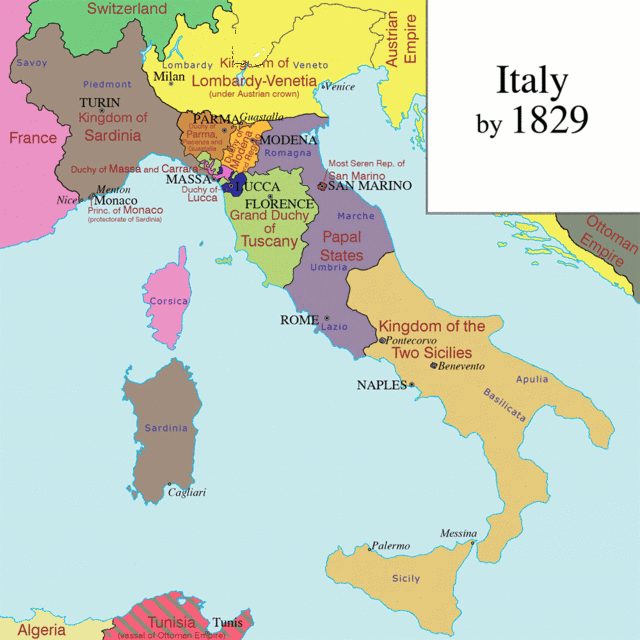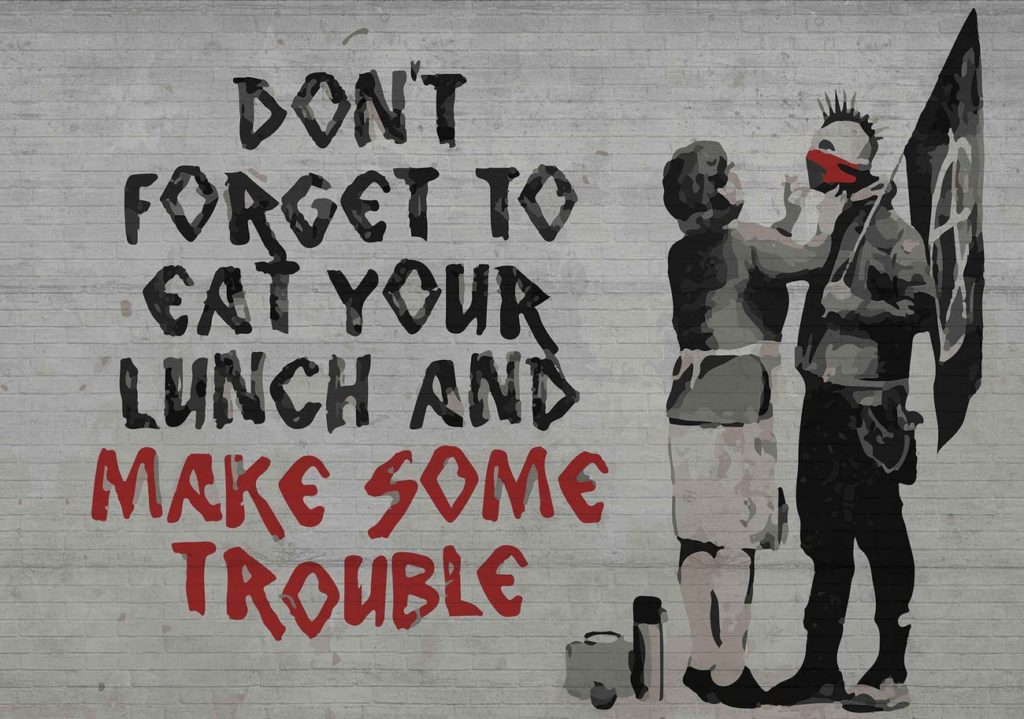PART II
Now, we get concrete!
Up to this point, I have been conveying to you a common language. Now, it’s time to move beyond these abstractions.
I devote this section of our course to the making of the Liberal Democratic Nation-state. I use the word making quite deliberately. Everything has a history, including even you. To understand any phenomenon, we need to begin with its roots (or, to go further back, its cosmic and/or divine origins, atomic features, chemistry, etc.). The roots of Liberal democracy and the invention of viable institutions to put this idea into practice didn’t have from nowhere. Like you, they have long histories.
To illustrate my point, I shall argue that there was nothing inevitable about the rise of liberal politics, values, and ideas in the western world. Alas, as we are learening today. there is also nothing inevitable about liberal-democracy’s survival.
We are very are lucky to live in a liberal society! See what Warren Buffett has to say about the “Ovarian Factor”: READ What does this article have to do with my arguments? (By the way, did you know that federal funding for prostate cancer research [per years of life lost] is nearly 12 times greater than funding for research on ovarian cancer? See here. How would you explain the disparity?)
Once we have worked our way through this historical background, I will provide you with some clues for understanding the crisis of liberal democratic politics in the US and Europe today.
6. LECTURE: Monday, September 9
Reflections on the development of a social, political, and economic culture that was conducive to the rise of Liberalism.
Today’s Assumption: Major events in Europe between the fifth and nineteenth centuries–the fall of the Roman empire, the birth of feudalism, and the Industrial Revolution–eventually made the institution of Modern Liberalism possible, although definitely not inevitable.
Assignment: Print and read the following chapter (Chapter 5) by Max Weber, one of the most influential, early social scientists and a pioneer of the theory of “unintended consequences.” As you reflect upon the essay by the Catholic priest, Martin Luther–Luther was definitely not a Protestant!–keep this point in mind. We can never understand our culture, or ourselves as individuals, without recognizing that those of us who grew up in North America were all raised as “Protestants.” Yes, this is true even of those Americans who self-identify as Catholics, and for that matter, even as atheists. To make sense of this statement, the key point is to understand what I mean by “Protestant.”
Max Weber, The Protestant Ethic and the Spirit of Capitalism, only chapter 5: PRINT AND READ
Martin Luther, “The Freedom of a Christian” READ This is a long essay by an angry Catholic priest. Don’t worry about the details of Luther’s argument (there’s too much you that you won’t know). Just seek to get a general sense for the tone and content of his argument.
Also reflect upon this dirty secret about the nature of fundamental political change:
Benjamin Ginsberg, “Why Violence Works.” PRINT AND READ
7. LECTURE: Wednesday, September 11
Reflections on a meteoric development that shaped the character of Liberalism as we know it today: the opening of the boundaries of the political realm to the participation of ever broader sectors of society. This development took place in different ways and in different countries. It is still taking place around the world today, even in the United States.
Today’s Assumption: The tumultuous intrusion of the “unwashed and unwanted” into the Liberal arena was unanticipated and, paradoxically, not welcomed by those whose decisions made it possible. Yet only they could have made this development possible. How do we account for this unforeseen and unforeseeable transformation? Since people in power do not intentionally make decisions that will undermine their interests, I shall argue that a hostile idea, such as Liberalism, could only have arisen as the unintended consequences of the decisions of power holders.
“In a democracy it’s your vote that counts. In feudalism, it’s your count that votes!” (McAdams)
Readings: .
Roger Kingdon, America the Unusual, chapter 4
The American “Declaration of Independence” PRINT AND READ
The French National Assembly, “Declaration of the Rights of Man and Citizen” PRINT AND READ
The ideas behind the American Revolution and the French Revolution were different in important ways, although each resulted in liberal democratic institutions. How are these differences reflected in the two founding declarations above?
The birth of a nation-state: WATCH “Italy” become Italy

8. DISCUSSION SECTION: Friday, September 13
Discussion themes: Your discussion today will be focus on the following theme: “America’s culture of radical individualism means that we are all Protestants?” You should keep the following questions in mind: 1) If McAdams is right (and not crazy), what does he mean by calling American Catholics “Protestants”?; 2) Is the culture of radical individualism that grew out of Protestantism and is epitomized by the archetypical American hero, such as Arnold Schwarzenegger (see Pumping Iron) and Eminem (see Eight Mile), a always a positive thing?
Assignment: Does Notre Dame represent a successful alternative to the unintended product of Protestantism that Weber calls the ‘iron cage?” Write one succinct, tightly argued paragraph in response to this question.
9. LECTURE: Monday, September 16
Reflections on the evolution of Political Parties in the West: Cadre parties, Mass parties, and Catch-all parties.
Today’s Assumption: Political Parties have been major instruments for including disparate groups of people in the modern nation-state, both in Liberal societies and, as we shall see later, other types of societies. Today, the catch-all party is the predominant type of party in the Liberal world, but it is increasingly under threat.
Assignment: Reflect upon the role of catch-all parties in our era of intense polarization. If election to office is dependent on the financial contributions of special interests and the manipulation of voting districts and access to the voting booth, what is the reward for politicians to engage in compromise? These questions are directly related to the flagging fortunes of catch-all parties. If the idea of the catch-all party should fail, what type of party will replace it? Or without such parties, will liberal democracy simply fade away?
Roger Kingdon, America the Unusual, chapter 2
Michael Kazen, “How can Donald Trump and Bernie Sanders both be ‘populist’?” READ
Cas Mudde and Cristobal Kaltwasser, Populism, chapters 1, 5. READ
Steven Levitsky and Daniel Ziblatt, “This is how democracies fail,” New York Times, January 19, 2018 PRINT AND READ
Yet, such stories are always more complicated that we would like to assume:
Max Fischer, “After a rocky 2018, populism is down but far from out in the West,” New York Times, January 5, 2019: PRINT AND READ
10. LECTURE: Wednesday, September 18
The advent of Fascism in Europe in the first half of the twentieth century was a searing challenge to the values and institutions of Liberalism. The Liberal response to Fascism was the Welfare State. Today, all Liberal states are Welfare States in one respect or another.
Today’s Assumptions: Because we live in a liberal-democratic polity, we naturally assume that the Liberal idea will be instantly appealing to all people. Yet, Liberalism‘s victory over Fascism in the twentieth century was far from certain. The good news is that liberal democracy won. Yet its triumph was facilitated by the convenient conjunction of two factors: the Allied powers’ (sometimes slight) military advantage and the West’s acceptance of the idea of the Liberal Welfare State.
During the Obama years, the President’s critics sometimes equated the Liberal Welfare State with Socialism. Indeed, thanks to the rise of politicians like Bernie Sanders and Alexandria Ocasio-Cortez, the current US President frequently warns of the threat of Socialism. But the assumption that socialism is the same everywhere is historically inaccurate. First, Fascism was a Socialist system of government; so was another political identity that we will consider in a couple weeks, Leninism. Second, Sanders and AOC have little in common with Fascism and Leninism. Thus, they call themselves “democratic socialists,” a kind of strong-state liberalism that is akin to the policies of Social Democratic parties in Europe.
Assignments: Don’t freak out! There are a lot of readings under the two topics below (Fascism and Welfare State), but aside from Mussolini’s crucial essay (which you should read for his general argument) and the Kingdon chapters, most are short, and I am only asking you to print a few of them. Use your own judgment in deciding how closely to read the longer ones.
I. On the subject of Fascism, read both Benito Mussolini’s prognostications as well as the testimonies of some of people who fell in love with the movement. Then, reflect upon the significance of the recent popularity of hard-core Right-wing movements in Europe and the US. Could Fascism be lurking in our future? Or is the Modern Welfare State enough to save us?
Major Reading: Benito Mussolini, “The Doctrine of Fascism” PRINT AND READ Don’t worry about all the details, just get a general sense for his argument and why it might be appealing.
Steinhoff, Pechel, and Showalter, Voices from the Third Reich (PDF FILE)
Question: Is there good or bad news looming on the contemporary horizon?
Dan Holleran, “The Opportunistic Rise of Europe’s Far Right,” The New Republic, February 16, 2018 PRINT AND READ
Timothy Snyder is worried (Guardian, October 30, 2018) PRINT AND READ
Thomas Meaney is not as worried (New Statesman, September 12, 2018) PRINT AND READ
2. On the subject of the Welfare State read:
Kingdon: America the Unusual, chapters 1 and 3.
Pew Foundation: “Five Ways in Which Americans and Europeans are Different” READ
Comparing Welfare States SKIM This page will give you a sense for the diverse types of liberal welfare states.
What might path dependency have to do with it? Comparative policies on public funding for maternity leave and child care and early childhood education: READ
And, “Going Dutch” READ. A personal account of the Welfare State in action! I have spent a good amount of my life living in Germany, and I have consistently been amazed at the benefits of a social-democratic welfare state
11. DISCUSSION SECTION: September, Friday, 20
Discussion Topic: Are liberal democratic institutions in the United States and Europe strong enough to survive the rise of populist extremism?
For today’s section, read articles below.
Cas Mudde and Cristobal Kaltwasser, Populism, chapters 3 and 4.
David Brooks, “How Democracies Perish,” New York Times, January 11, 2018 READ. Based on this reading, who is right, Brooks or Deneen (Notre Dame)?

Paragraph topic: “Will populism eventually lead to the demise of liberal democracy?” If yes, why? If no, why not? You may only take one side.
We have two goals in making this assignment:
- The first goal is to get you to think about the meaning of “populism” and “liberal democracy.”
- The second is to ask you to a great introductory paragraph should take. Unlike the paragraphs that you have written up to this point, please write an introductory paragraph for a paper for a hypothetical paper. Introductory paragraphs should typically do the following things: 1) state the issue; 2) make an argument and identify a counterargument; 3) provide the reader with a sense of how you will proceed.
Your first REFLECTIVE ESSAY ASSIGNMENT is HERE
12. LECTURE: Monday, September 23
Reflections on the inherently contradictory and conflict-ridden characteristics of Liberalism.
Today’s Assumption: Liberalism can’t live up to its name unless it has certain essential features. I have already outlined four characteristics. Yet by nature, Liberalism is unstable. The Liberal-democratic character of our government today is not necessarily the same as it will be tomorrow; jt is certainly not the same as it was yesterday (especially in the current political climate!). Still, this capacity for change can be a very good thing. Indeed, if such Liberal-democratic bastions as Iceland, Monaco, Slovenia, Liechtenstein, Andorra, and the U.S. didn’t change over time, they wouldn’t be Liberal at all.
The Liberal-democratic character of our government today is not necessarily the same as it will be tomorrow; jt is certainly not the same as it was yesterday (especially in the current political climate!). Still, this capacity for change can be a very good thing. Indeed, if such Liberal-democratic bastions as Iceland, Monaco, Slovenia, Liechtenstein, Andorra, and the U.S. didn’t change over time, they wouldn’t be Liberal at all.
Liberal democracy is not only inherently conflictual. Regrettably, the features that make this political identity great can also be the source of its unraveling. In certain circumstances, good causes can be transformed into ugly sources of unrest and instability. We can see this in the U.S. and Europe today.
Reading assignments (most of them are short):
America is one darn complicated country
Suzy Hansen, “Unlearning the Myth of American Innocence” READ
The Good…
Kingdon, America the Unusual, ch. 5.
Chris McGreal, “The S-word: How Young Americans Fell in Love with Socialism” READ
What does citizenship have to do with it? READ
What does Notre Dame have to do with it? Read about Notre Dame students battling the Ku Klux Klan: READ
…the Bad, and the Ugly
Richard Fausset, “A Voice of Hate in America”: READ This article was widely criticized after its publication for humanizing fascism and extremism. Do you think this is a fair criticism?
NOTE: There are Leftist extremists, too.
See Peter Beinart, “The Rise of the Violent Left, The Atlantic, READ
Anonymous, #OpDomesticTerrorism: SCAN
Anonymous – Message to Charlottesville #OpDomesticTerrorism WATCH
Consider this: Under what circumstances would you resort to violence to protect Liberal Democracy? Or do you think the preservation of Liberal Democracy isn’t worth the risk of violence? If so, why?

“I am Anonymous”
13. REQUIRED EVENING FILM: Monday, September 23 OR Tuesday, September 24
Time and Location: 7:00 pm on both nights; also both nights, Room B062 Jenkins Nanovic Halls
To make it easier for you to fit this film into your calendar, we will show it on two different evenings. Please choose which is best for you.
Film #1: “The War at Home”
The events in this film illustrate the necessarily conflictual and unstable character of liberal democracy.
Also, What! Protest at Notre Dame? READ
If it is impossible for you to view the film on either of these evenings, you may be able to find it on-line. However, I strongly recommend that you see the film on one of these evenings since you will get a better impression by viewing it on a big screen.
14. OPEN CLASS DISCUSSION: Wednesday, September 25
I invite you to argue with me. And why not?
Kneeling at Our Lady’s University: READ
15. NO DISCUSSION SECTION: Friday, September 27
Your Reflective Essay will be due on this date. There will be no discussion section since you have been writing your essay.
It is your responsibility to make sure that your TA receives your essay on time. He or she will clarify when and how you are to turn it in. Your essay should have a title and be double-spaced. See above for all of the other specifications. Be sure to put your name on your essay.
NOTE: Please do not use electronic devices of any kind during our class, including laptops, cell phones, tablets, tape recorders, FBI trap-and-trace technology or any other personal digital device. My classroom is a tweet-free zone!
